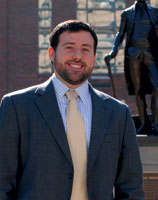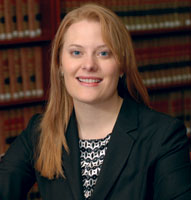A Gateway to Success
Generous gifts from alumni and friends open doors of opportunity for GW Law scholars
Paying for a top-quality legal education—never an easy feat—has become increasingly daunting in recent months, as the worldwide economic crisis hits deep at the pockets of prospective law students and their families. The George Washington University Law School is meeting the challenge head-on, thanks to the generosity of a devoted group of GW Law alumni and friends who have established scholarship funds and endowments for deserving students.
“Few gifts directly affect students like scholarships,” says Rich Collins, executive director of law school development. According to Collins, individuals, firms, and classes are creating a growing number of funds to enable talented young men and women to attend GW Law, regardless of their ability to meet the high cost of tuition. “The opportunity presented by scholarship gifts is particularly important today, as students face a difficult job market and significant debt,” he says.
Class scholarship funds are growing at an unprecedented rate, Collins adds. “Recent classes, including the classes of 2005, 2006, 2007, and 2008, have set a new standard by focusing their gifts on class scholarship funds,” he says. “Their collective efforts have inspired other classes to direct reunion gifts for scholarships—including the classes of 1973 and 1978.”
Endowments are another popular form of giving because they ensure support in perpetuity. “The principal of the gift is invested, and the annual income is used for the designated purpose,” Collins explains. “For many donors, establishment of an endowed scholarship or fellowship is a way to give something back and provide future generations with the same opportunities they have enjoyed.”
On the pages that follow, we recognize the donors of GW Law’s scholarship funds, along with the talented, passionate students who are benefiting from them.
Jonathan D. Janow, JD ’08
Recipient of the Thomas Searing Jackson Scholarship

Jessica McConnell
An inherent problem solver, Jonathan Janow knew a career in law would complement his analytical side. “The law provides me with a vehicle to try and solve a wide array of problems by reasoning through them and determining what steps might be successful,” he says.
Janow, who received his undergraduate degree magna cum laude from the University of Maryland in 2002, assumed much of the responsibility for financing his GW Law education. Receiving the Thomas Searing Jackson Scholarship, Janow says, was a distinct privilege. “I remain grateful,” he adds. “The scholarship has helped to ease the financial burdens associated with getting a law degree at a top school like GW.”
In his first year out of GW Law, Janow currently serves as a law clerk to Hon. Magistrate Judge Alan Kay of the U.S. District Court for the District of Columbia. Next fall, he will serve as a law clerk to Hon. Judge Julia Gibbons of the U.S. Court of Appeals for the 6th Circuit.
Janow, who graduated with highest honors and as a member of Order of the Coif, says it was a challenge to quickly turn from the theoretical nature of law school to the busy docket he encounters each day, but he maintains that GW Law has helped shape him as a professional. The support from his alma mater continues after graduation, he adds. “As I hope to practice in Washington, I feel as though I am surrounded by GW Law friends and associates here in D.C. and that this will provide an invaluable network going forward.”
Bill Chemnick, JD ’08
Recipient of the Jacob and Charlotte Lehrman Foundation Clinical Scholarship

Jessica McConnell
Before law school, Bill Chemnick spent two years with Teach for America in a low-performing South Bronx middle school. Through mediation workshops and mentoring, Chemnick helped teach his students that they were worthy of respect and could resolve conflicts nonviolently. “From my experience, I realized that I could improve a community,” he says, “by showing individuals how to constructively advocate for change.”
Chemnick carried that ambition with him to GW Law, where he was awarded the 2007-08 Lehrman Foundation Clinical Scholarship and worked as the student director for the Law School’s Civil and Family Litigation Clinic. At the clinic, where law students serve economically disadvantaged clients, Chemnick says he discovered the most important lessons of his legal education. “I learned that a successful public interest attorney must not only possess strong legal reasoning skills but also the ability to form a close, personal relationship with his or her clients, the sensitivity to understand and properly respond to a client’s personal challenges or special needs, and the tenacity to work within a legal system that often disfavors underprivileged clients,” he says.
Chemnick, who received his undergraduate degree from Colorado College, also joined the International Human Rights Clinic as a GW Law student and volunteered at a juvenile detention center in Alexandria, Va., where he taught incarcerated youth about their constitutional rights. Today he works as a first-year litigation associate pending admission at Schulte Roth & Zabel in New York.
Kristalyn Joy Loson, JD ’09
Recipient of the Glen A. Wilkinson Scholarship

Jessica McConnell
After completing her business degree at the University of Miami, Kristalyn Loson worked at a United Way helpline and witnessed the desperate need for legal assistance, especially among those in low-income communities. “I realized how lucky I was to be given the opportunity to attend law school,” she says.
Inspired by her post-college experience, 3L Loson has chosen to pursue the specialized area of nonprofit law, which she hopes to use in a career counseling the United Way or other organizations. Loson, who is a member of the Public Contract Law Journal and the Equal Justice Foundation, says receiving the Glen A. Wilkinson Scholarship has helped her focus more intently on her future career path. In particular, the generous award has allowed her to seek out opportunities such as judicial internships, instead of having to search for part-time jobs to pay the bills. She says the experience has been unparalleled.
“When I originally chose GW, I realized that I was attending a big, nationally ranked school over smaller, more intimate environments,” she says. “However, I have been surprised to really feel part of a close-knit community. The award has made me feel more connected to GW and the alumni community.”
Loson, who is also a Thurgood Marshall Scholar and coordinates all internal and external mock trial competitions as president of the Mock Trial Board, says she is inspired to make a difference.
“I am so appreciative of the award and hope someday to return the favor to another student,” Loson says. A legal education, she adds, leads to “a rewarding career and a chance to gain skills that could be used for the betterment of the community.”
Joseph R. Oliveri, JD ’08
Recipient of the Raymond F. Hossfeld Scholarship

Jessica McConnell
As a Writing Fellow and Dean’s Fellow for GW Law’s Legal Research and Writing Program, Joseph Oliveri says he learned valuable lessons from everyday experiences. He worked with skilled faculty members, mentored fellow students, and co-taught first-year advocacy courses and classes on legal research and writing. These strong academic relationships, he says, helped shape his schooling. “It is often said that an institution’s people are its greatest resource, and this is certainly true of GW Law,” Oliveri explains.
Oliveri, who graduated with highest honors and as a member of Order of the Coif, used his writing know-how as managing editor of The George Washington Law Review, where his essay “Converse-Erie, The Key to Federalism in an Increasingly Administrative State” was published in 2008. An alumnus of Harvard, Oliveri was also involved at GW Law on the Moot Court Board and was vice president of external affairs and treasurer of the Alternative Dispute Resolution Board.
In his legal studies, Oliveri says he has been fortunate to work closely with two judges. He interned with Hon. Richard J. Leon of the U.S. District Court for the District of Columbia, and today he is clerking for Hon. Edward C. Prado of the U.S. Court of Appeals for the 5th Circuit. He says he is proud to learn from two brilliant jurists and mentors. He is also thankful, he says, for the legal education, generous scholarship, and unmatched opportunities for discovery at his Law School alma mater.
As a GW Law student, “I grew tremendously as both a legal thinker and writer,” Oliveri says. After his clerkship, Oliveri will join Kirkland & Ellis LLP.

